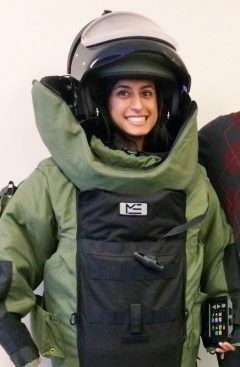
Julia Lauv, M.IPIS 2021
I had worked in the federal public service for over 10 years and wanted to learn more about critical infrastructure and international security. I wanted to find something that would complement the work I do in the office. What interested me about IPIS was the wide variety of interesting courses. Being out of the academic world for over 10 years, I was worried I wouldn’t be able to learn the way I used to. Enrolling as a part time student while still working full time was quite the challenge. Despite that, I found that my 10 years of working experience really helped me grab the content and view the bigger picture in the various courses. I found that working in the industry already as an intelligence analyst helped me pick up the content and learn and take in even more than I thought I would. It not only gave me the information and education on the subject matter, but it also opened up various resources and mental connections on the topics that will inevitably be useful in my career in the future.
Julia Lauv, M.IPIS 2021

Alex Green, M.IPIS 2019
I selected IPIS because I wanted a degree that was interdisciplinary, practical, and one that could prepare me for both a PhD and a job in the security field. According to my research, there were only two graduate programs within Canada that could meet that brief. Ultimately, I opted for IPIS because of Carleton University’s proximity to the Government of Canada and the quality of instructors. My decision was cemented by the varied course selection and co-op opportunities. I enrolled in engineering and social science courses that emphasized policy relevant research and practical application. I feel that the program prepared me for both the job market and academia. I now work in the security field and am pursuing a PhD in War Studies.
Alex Green, M.IPIS 2019

Divya Raghani, MEng IPIS 2018
Divya Raghani is currently working as an Asset Management Consultant with one of the world’s leading engineering consulting firms, WSP. Within the advisory section, Divya offers her expertise in holistically managing transportation and infrastructure assets. In completing a Masters of Engineering, the IPIS Program helped her pursue a 2-year career working with National Defence in strategically managing the largest infrastructure portfolio in Canada in support of the Canadian Armed Forces before transitioning to the private sector to engage in smaller scale and more complex asset portfolios. Divya completed her final project in blast effects on historical masonry and continues to enjoy exploring the dynamic ways she can apply her interdisciplinary education.

Nathan Patterson, M.IPIS 2020
When I started the IPIS program, I already had more than twenty years of experience working in international security, including as a senior operations and security consultant in the finance, health, information, and energy sectors. I had led multiple international teams responsible for critical infrastructure protection. Despite all of my prior experience, I found the IPIS program challenging and rewarding. I truly value the incredible relationships and experiences I had, and the opportunities to participate in projects and engage with new subject matter that I never dreamed of. I met senior policy makers from Canada, the U.N., and key international security and infrastructure organizations such as NATO and the IAEA. My career objective was to serve my community, and the IPIS program has helped start me off. I am still at the very early stages of my public service, and while the Covid-19 pandemic has created obstacles it has also taught me the importance that seemingly small contributions can make during an emergency. I am particularly grateful for the opportunity the IPIS program gave me to expand the depth and breadth of my skills, pursue my passion, and for the many unique opportunities to serve during the biggest security event in Canada and the world.
Nathan Patterson, M.IPIS 2020
